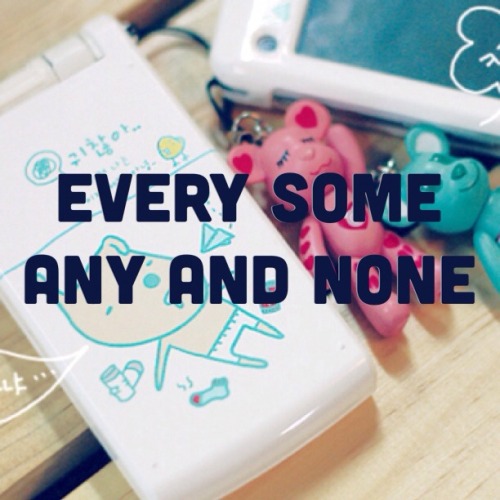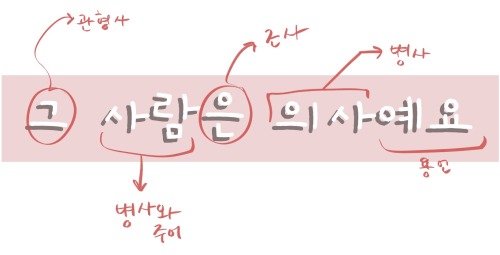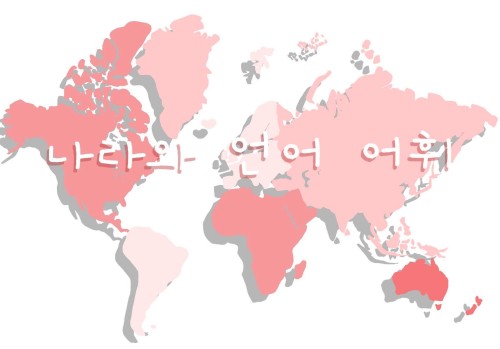#k vocab
yesterday - 어제 - eo je
today - 오늘 - o neul
tomorrow - 내일 - nae il
now - 지금 - ji geum
then - 그때 - geu ttae
later - 나중에/후에 - na jung e / hu e
tonight - 오늘밤 - o neul bam
right now - 바로 지금 - ba ro ji geum
last night - 지난 밤 - ji nan bam
this morning - 오늘 아침 - o neur a chim
next week - 다음 주 - da eum ju
already - 이미 - i mi
recently - 최근에 - choe geun e
lately - 최근에/얼마 전에 - choe geun e / eol ma jeon e
soon - 곧 - got
immediately - 바로/즉시 - ba ro / jeuk si
still - 아직도 - a jik do
yet - 아직 - a jik
ago - 전에 - jeon e
EVERY SOME ANY AND NONE
모든 every
모든 것 everything
모든 사람 every person~나 every
어디나 everywhere
언제나 every time
누구나 everybody~ㄴ가 some
어딘가 somewhere
뭔가 something
언젠가 sometime
누군가 somebody아무 any…
아무나 anyone
아무거나 anything
아무데나 anywhere
아무 때나 anytime아무도 no…
아무도 nobody
아무것도 nothing
아무데도 nowhere~특별한 짱보라
Post link
to make you sound like u kno what youre talkin about YES
(I added the pronounciation - not the romanization i.e. 있다: “ㅅ” is pronounced as “s” but followed by a consonant its pronounced as “d” like idda.)So I decided to do it in korean, and I did germantoo
First Verbs
- be - 이다 (ida)
- there is - 있다 (idda)
- have - 가지다 (gajida)
- do - 하다 (hada)
- go - 가다 (gada)
- want - 원하다 (wonhada)
- can - 할 수 있다 (hal su idda)
- need - 필요하다 (pilyohada)
- think - 생각하다 (saengag hada)
- know - 알다 (alda)
- say - 말하다 (malhada)
- like - 좋아하다 ( jo a hada)
- speak - 말하다 (malhada)
- learn - 배우다 (bae uda)
- understand - 이해하다 (i hae hada)
School Vocabulary
학교 school
유치원 kindergarten
초등학교 elementary school
중학교 middle school
고등학교 high school
대학교 university
수업 lesson
과학 science
수학 math
역사 history
예술 art
영어 English
종이 paper
칠판 blackboard
연필 pencil
자 ruler
책 book
필통 pencil case
가위 scissors
공책 notebook
펜 pen
지우개 eraser
선생님 teacher
교수 professor
학생 student
공부하다 to study
연습하다 to practice
배우다 to learn
심심하다 to be bored
지루하다 to be boring
숙제 homework
시험 test
수필 essay
의자 chair
책상 desk
컴퓨터 computer
책장 book caseAdd 실 to make it a classroom.
Example: 예술실 is art classroom.포스팅 많이 못해서 미안합니다. ㅠ^ㅠ
큰 시험을 본 후에 많이 포스팅하겠습니당~.
~짱보라
Post link
Personality vocabulary 성격 관련 어휘
적극적이다 active
느긋하다 laid-back
외향적이다 extroverted
솔직하다 honest
명랑하다 cheerful
친절하다 friendly
착하다 kind
침착하다 calm, cool
성실하다 sincere
참을성이 많다 patient
활달하다 outgoing
털털하다 easy-going
겸손하다 modest
밝다 bright
흥분을 잘 하다 enthusiastic
활동적이다 energetic
단순하다 simple-minded
순수하다 pure
끈기 있다 have perseverance
차분하다 relaxed, poised
자상하다 thoughtful
배려심이 많다 caring
낙천적이다 optimistic
싹싹하다 amiable
성격이 급하다 impatient, restless
소심하다 timid
변덕스럽다 fickle
덜렁거리다 clumsy, forgetful
게으르다 lazy
거만하다 proud/snobby
건방지다 arrogant/cocky
덤벙거리다 careless
예민하다 sensitive
고집이 세다 stubborn
무뚝뚝하다 blunt
어둡다 dark
우울하다 depressed
꼼꼼하다 meticulous
초조하다 anxious
욱하다 short-tempered
비관적이다 pessimistic
수동적이다 passive
공격적이다 aggressive
우유부단하다 indecisive
품사 - Parts of Speech
Since my post from yesterday, I got a lot of requests to do more linguistic terms. I don’t think this is a comprehensive list, so if there’s any that you know that aren’t here, put it in the chat! Enjoy <3
♡ 자음 – consonant
ex. ㄱ, ㄷ, ㄴ, ㅅ, ㅇ
♡ 모음 – vowel
ex. 아, 어, 이, 애
Hangul [ x||x]
♡ 초성 – word-initial consonant
ex. ㅂ in 볶음
♡ 중성 – word-medial consonant
ex. ㄲ/ㅇ in 볶음
♡ 종성/ 받침 - word-final consonant (받침 literally means “support”)
ex. ㅁ in 볶음
♡ 글자 – letter
♡ 발음(하다) – pronunciation (to pronounce)
ex. 볶음 -> 보끔
♡ 예사소리/평음 – plain consonant (lit. ordinary sound/peaceful note)
ex. ㄱ, ㅂ, ㄷ, ㅅ, ㅈ
♡ 된소리/경음 – tense consonant (lit. Fortis sound/hard note)
ex. ㄲ, ㅃ, ㄸ, ㅆ, ㅉ
♡ 거센소리/격음 – aspirated consonant (lit. rough sound); 거센 from 거세다 (to be rough/violent)
ex. ㅋ, ㅍ, ㅌ, ㅊ
✿ 한국어를 배우는 외국인들은 된소리와 거센소리의 발음을 어려워한다. Foreigners learning Korean have a difficult time pronouncing tense and aspirated sounds.✿
♡ 복합어 – compound
ex. 물고기 (물 “water” + 고리 “meat”), 남자친구 (남자 “boy/man” + 친구 “friend”)
♡ 파생어 – derivative
ex. -관 (building – from 館); 영화 “movie” + -관 = 영화관 “theatre (lit. movie building)”
♡ 접두사 – prefix
ex. 되- (similar to “re-” prefix in English); 되- + 들다 “to enter” = 되들다 “to reenter”
♡ 접미사 – suffix
ex. -님 (polite title for someone older/you don’t know); 기사 “driver” + -님 = polite form to address the driver
♡ 어간 – stem
ex. 먹 from 먹다
♡ 어미 – ending
ex. -고 있다 (progressive tense); 먹다 + -고 있다 = 먹고 있다 “to be eating”
♡ 속어 – slang expression
♡ 숙어 – idiomatic expression
♡ 반의어 – antonym
♡ 유의어 – synonym
♡ 어원 – origin / etymology
♡ 예문 – example
♡ 용언 – a conjugated verb
More Parts of Speech - Related to the Sentence
♡ 명사 – noun
ex. 연필 “pencil”, 사람, “person”, 중국 “China”
♡ 대명사 – pronoun
ex. 나 “I/me (informal)”
♡ 수사 – numeral [go here]
♡ 동사 – verb [x || x || x]
자동사 – intransitive verb (cannot take a direct object)
타동사 – transitive verb (must take a direct object)
♡ 형용사 – adjective
ex. 예쁘다 “to be pretty”, 슬프다 “to be sad”
♡ 관형사 – determiner
ex. 이 “this”, 그 “that”, 저 “that over there”
♡ 부사 – adverb
ex. 나중에 “late”, 천천히 “slowly”
♡ 조사 – particle/postposition
ex. 은/는, 이/가, 을/를, 도, 에/에서
♡ 감탄사 – interjection
ex. 우와! “wow”, 아야 “ouch”, 대박 “amazing”, 헐 “omg”, 뭐라고?/뭐? “what?”
♡ 문법 – grammar
♡ 시제 – tense
ex. 과거 (시제) “past”, 현재 (시제) “present”, 미래 (시제) “future”
♡ 인칭 – person
ex. 1(일)인칭 (단수) “first person (singular)”, 3(삼)인칭 (복수) “third person (plural)”
♡ 구(문) – phrase [x || x || x || x]
♡ 절 – clause
♡ 문장 – sentence
♡ 주어 – subject
♡ 서술어 – predicate
♡ 목적어 – object
직접 목적어 – direct object
간접 목적어 – indirect object’
Hope this helped! Happy Learning :)
~ SK101
Post link
나라와 언어 어휘 - Country and Language Vocab
It’s been such a long time since I provided a vocabulary list! In my final year of university, I have to do a lot of language reports that result in me comparing and contrasting a lot of language families (this usually includes sociolinguistics to typology). I thought that I could do a blog related to the countries and languages! This might not be an entirely comprehensive list. If I missed your country, let me know and I will add it! Enjoy <3
나라; 언어 - 번역 // Country; Language - Translation
- 대한민국/한국; 한국어 - Korea; Korean
- 중국; 중국어 - China; Chinese
- 일본; 일분어 - Japan; Japanese
- 태국; 태국어 - Thailand; Thai
- 독일; 독일어/히브리어 - Germany; German/Hebrew
- 러시아; 러시아어 - Russia; Russian
- 베트남; 베트남어 - Vietnam; Vietnamese
- 영국; 영어 - England; English
- 캐나다; 영어/프랑스어 - Canada; English/French
- 미국; 영어/스페인어 - America; English/Spanish
- 멕시코; 스페인어 - Mexico; Spanish
- 프랑스; 프랑스어 - France; French
- 스페인; 스페인어 - Spain; Spanish
- 인도; 힌디어/영어 - India; Hindi/English
- 이탈리아; 이탈리아어 - Italy; Italian
- 헝가리; 헝가리어 - Hungary; Hungarian
- 가나; 영어 - Ghana; English
- 그리스; 그리스어 - Greece; Greek
- 뉴질렌드; 영어/마오리어 - New Zealand; English/te reo Māori
- 덴마크; 덴마크어 - Denmark; Danish
- 레바논; 아랍어/프랑스어 - Lebanon; Arabic/French
- 루마니아; 루마니아어 - Romania; Romanian
- 말레이시아; 말레이시아어 - Malaysia; Malaysian
- 모로코; 아랍어 - Morocco; Arabic
- 브라질; 포르투갈어 - Brazil; Portuguese
- 스웨덴; 스웨덴어 - Sweden; Swedish
- 스위스; 독일어/프랑스어/이탈리아어/로만슈어/라틴어 - Switzerland; German/French/Italian/Romansch/Latin
- 아일렌드; 아일렌드어/영어 - Irish/English
- 알바니아; 알바니아어 - Albania; Albanian
- 이란; 페르시아어 - Iran; Persian
- 자메이카; 영어/파톼 - Jamaica; English/Patois
- 케냐; 영어/스와힐리어 - Kenya; English/Swahili
- 파키스탄 - 우르두어/영어 - Pakistan; Urdu/English
- 타이완/대만; 중국어 - Taiwan; Chinese
Some other important vocab:
- 언어 - language
- 표준어 - standard language
- 사투리 ~ 방언* - accent/dialect
- 우리말 - our language
- 외국어 - foreign language
- 대륙 - continent
- 동양 - the east
- 서양 - the west
- 아시아 - Asia
- 동남아시아 - Southeast Asia
- 유럽 - Europe
- 아프리카 - Africa
- 북아메리카 - North America
- 남아메리카 - South America
- 오세아니아 - Oceania
*사투리/방언 - while it’s generally assumed these are interchangeable, depending on a certain context, they can mean different things. 사투리 refers to the actual regional differences, whereas 방언 can include social differences and slang!
Like I said before, if I missed your country/language, let me know and I will add it!! Unfortunately, this list does not include Indigenous languages - but I am willing to do the extra research to find out more!
Happy Learning :)
~ SK101
Post link




